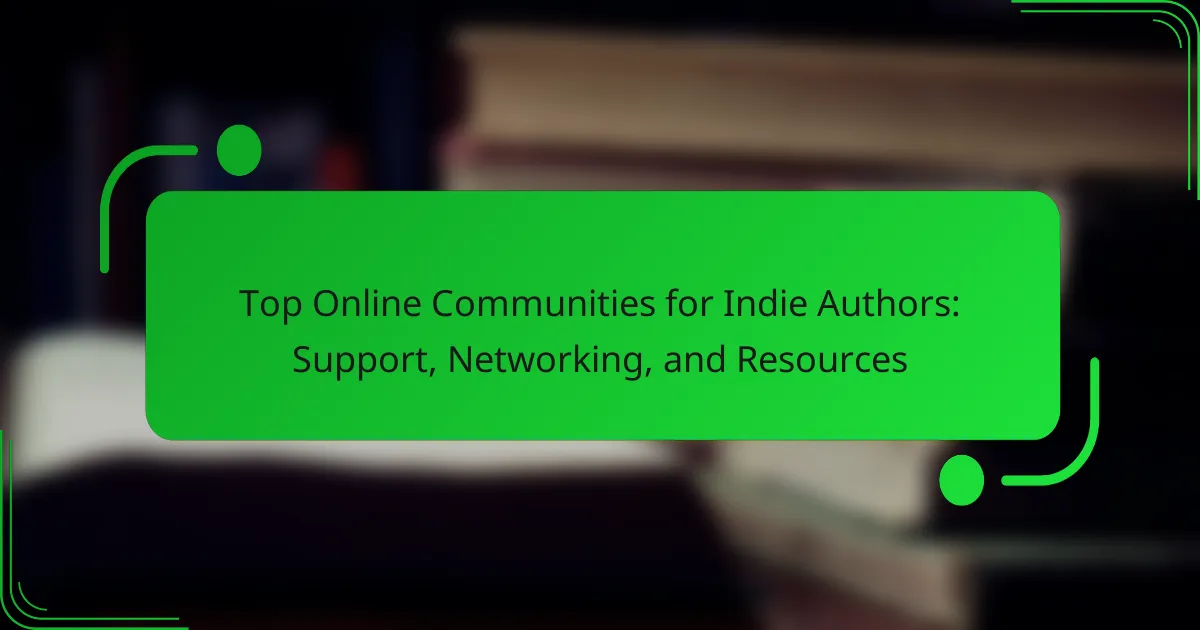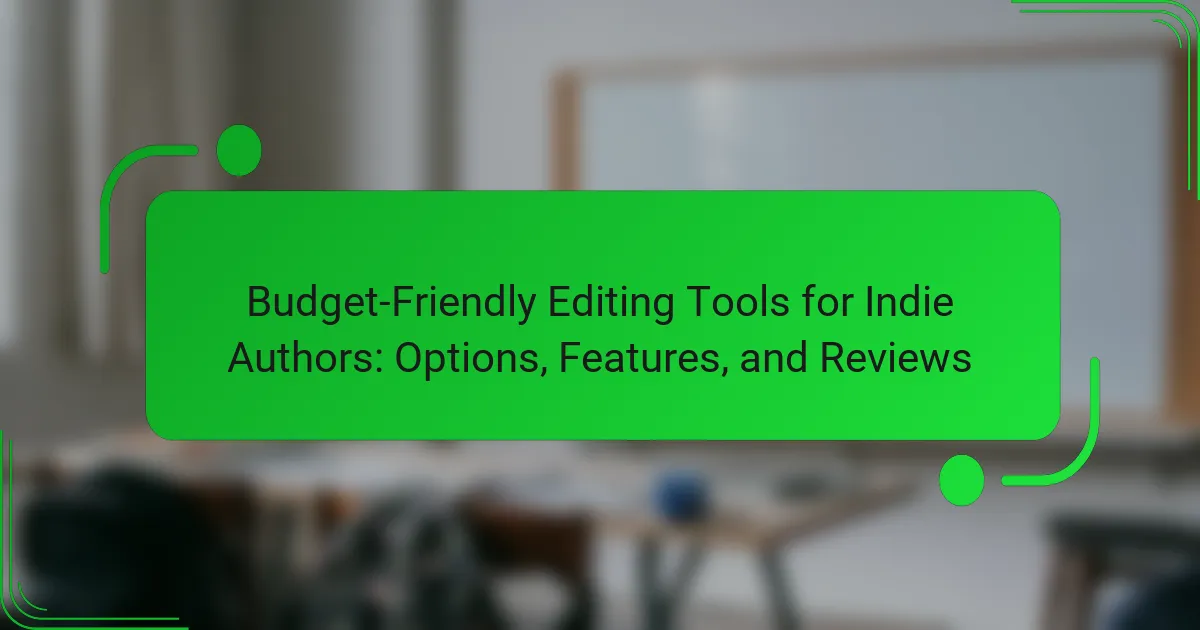Indie authors face challenges in self-publishing, including marketing, distribution, and quality control. Essential tools like writing software, formatting programs, and cover design services can enhance their success. Exploring various formats such as eBooks, print books, and audiobooks broadens readership. Accessing resources for editing and marketing further improves the quality and visibility of self-published works.
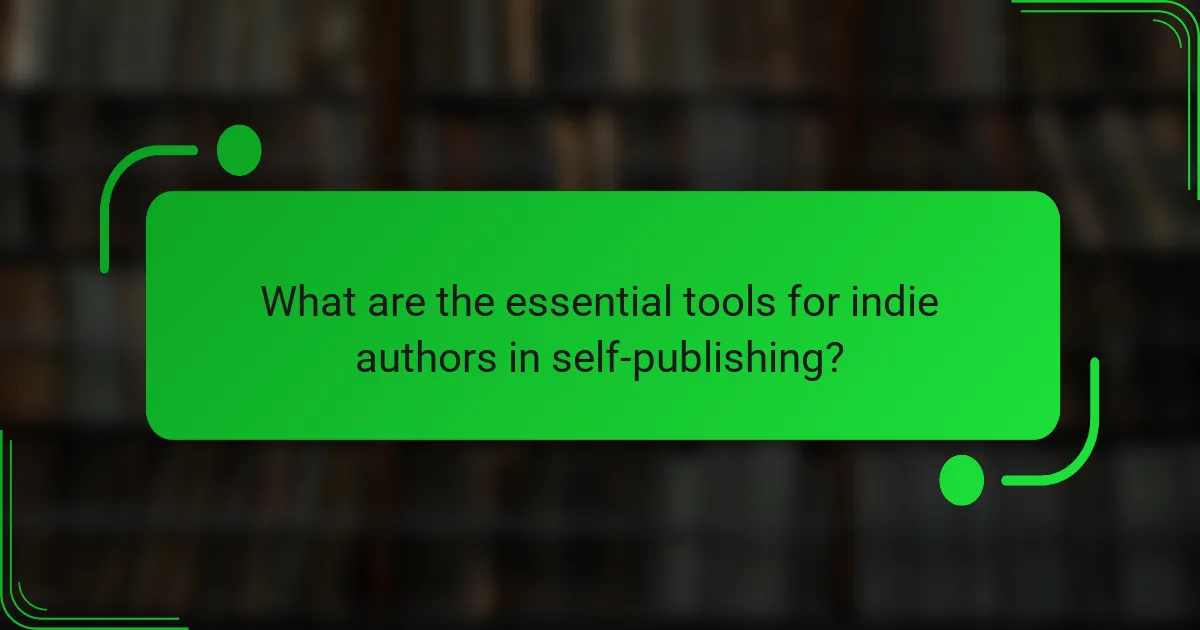
What are the essential tools for indie authors in self-publishing?
Indie authors need essential tools for self-publishing to ensure success. Key tools include writing software, formatting programs, cover design services, and distribution platforms.
Writing software like Scrivener helps organize drafts and notes effectively. Formatting programs such as Vellum streamline the process of preparing manuscripts for publication. Cover design services provide professional visuals that attract readers, while distribution platforms like Amazon Kindle Direct Publishing facilitate access to a wide audience.
Utilizing these tools enhances the quality and reach of self-published works, making them more competitive in the market.
How do writing software options enhance the writing process?
Writing software options significantly enhance the writing process by streamlining tasks and improving productivity. These tools offer features like grammar checking, formatting assistance, and collaboration capabilities, which help authors focus on content creation.
Many indie authors benefit from specific software attributes, such as customizable templates that cater to various publishing formats, including eBooks and print. Additionally, integrated research tools allow writers to gather information without leaving the platform, thus saving time.
Unique attributes of these tools include advanced analytics that track writing progress and provide insights into reader engagement. This data helps authors refine their work for better market alignment.
Rare attributes, such as AI-driven suggestions for plot development or character building, can further enhance creativity and originality in writing. Overall, leveraging these software options leads to a more efficient and successful self-publishing journey.
Which editing tools are most effective for indie authors?
Indie authors can effectively use tools like Scrivener, Grammarly, and Reedsy. Scrivener offers comprehensive writing and organization features, while Grammarly enhances editing and grammar checks. Reedsy connects authors with professional editors and designers for polished final products.
What role does formatting software play in self-publishing success?
Formatting software is crucial for self-publishing success as it ensures professional presentation and readability. It helps authors create visually appealing layouts, manage file formats, and meet publishing standards. Key benefits include enhanced formatting control, streamlined workflow, and improved accessibility for readers. Utilizing formatting software can significantly increase the chances of a book’s success in a competitive market.
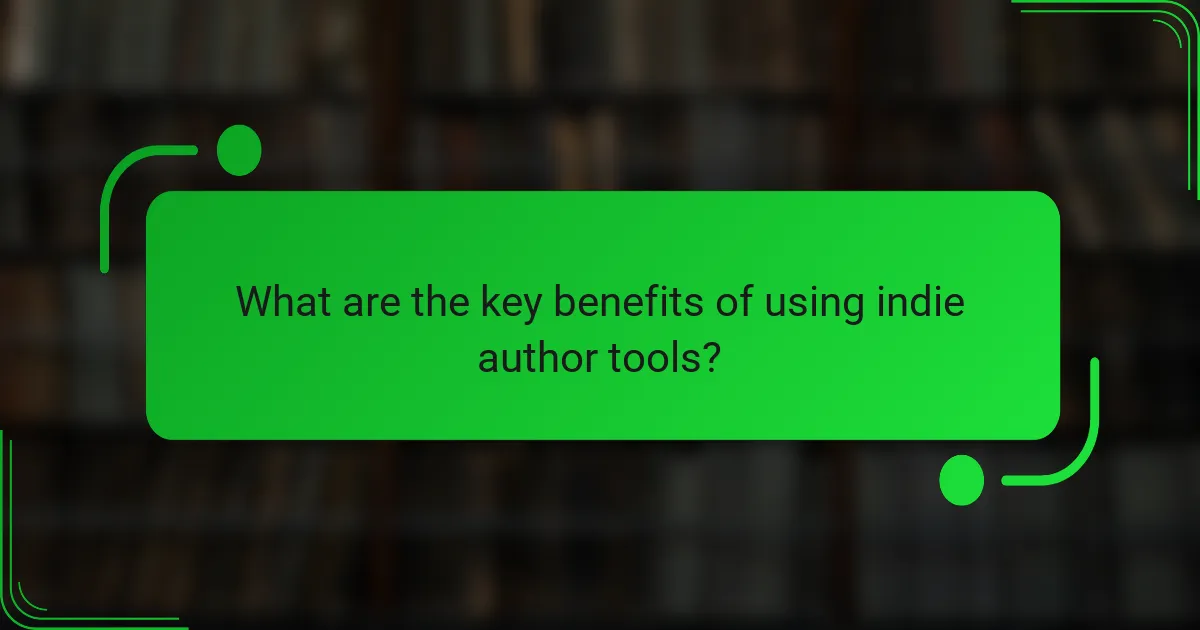
What are the key benefits of using indie author tools?
Indie author tools enhance self-publishing success by providing essential resources for writing, formatting, and marketing. Key benefits include increased control over the publishing process, access to professional-quality design tools, and improved visibility in a crowded market. These tools streamline workflows, allowing authors to focus on creativity while managing distribution and sales effectively. Additionally, many indie author tools offer analytics features that help track performance, enabling data-driven decisions for future projects.
How do these tools improve productivity and efficiency?
Indie author tools enhance productivity and efficiency by streamlining various aspects of the self-publishing process. These tools automate tasks like formatting, cover design, and marketing, allowing authors to focus on writing. For example, tools like Scrivener organize research and drafts, improving workflow. Additionally, platforms like Kindle Direct Publishing simplify distribution, enabling faster access to readers. Overall, these resources save time and reduce stress, contributing to a more effective publishing experience.
What cost savings can indie authors achieve with the right tools?
Indie authors can achieve significant cost savings with the right tools by streamlining their self-publishing processes. Utilizing software for formatting, editing, and marketing reduces expenses typically associated with hiring professionals. For example, tools like Scrivener and Reedsy offer affordable solutions for manuscript preparation, while platforms like Canva provide cost-effective design options for covers. Additionally, using social media management tools can enhance marketing efforts without the need for expensive advertising. These resources empower authors to maintain control over their projects and budgets.
How do tools influence the quality of self-published works?
Tools significantly enhance the quality of self-published works by providing essential resources and support. They streamline the writing, editing, and publishing processes, which leads to more polished final products.
Indie author tools include software for formatting, cover design, and marketing, each contributing to a professional presentation. For instance, formatting tools ensure correct layout, which impacts readability and overall appeal. Editing software helps identify grammatical errors, improving the manuscript’s clarity.
Moreover, access to publishing platforms allows authors to reach wider audiences, enhancing visibility. Resources like online courses and communities offer guidance, fostering skill development and networking opportunities.
Ultimately, the right tools empower indie authors to produce high-quality works that stand out in a competitive market.
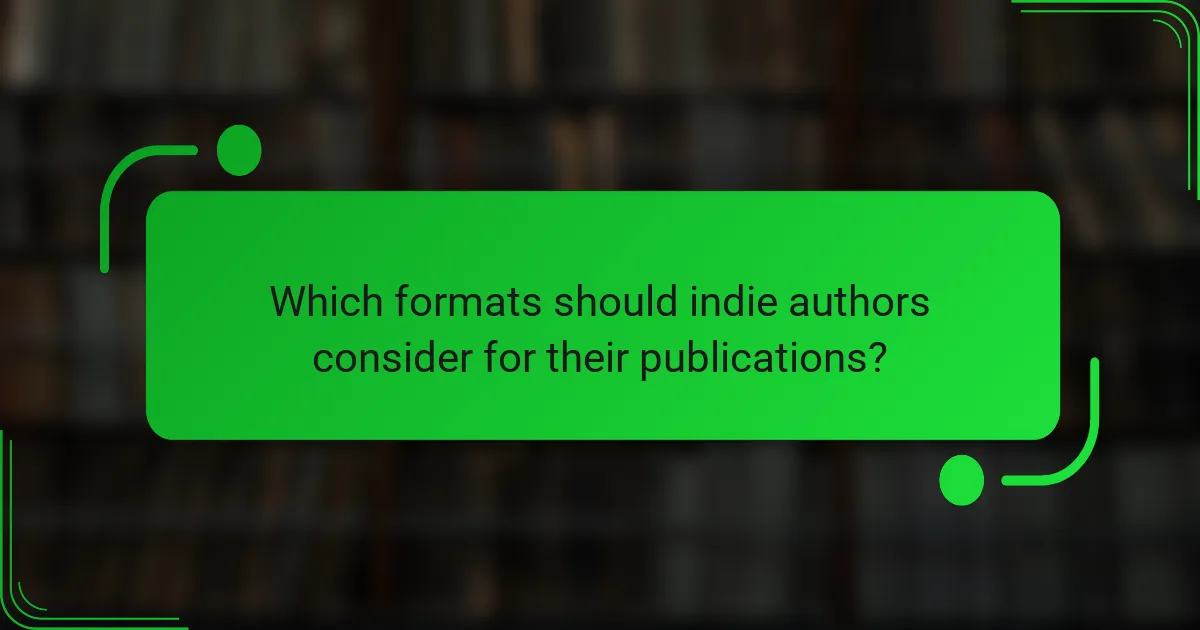
Which formats should indie authors consider for their publications?
Indie authors should consider various formats including eBooks, print books, audiobooks, and graphic novels. Each format offers unique benefits that can enhance readership and engagement.
1. eBooks: Cost-effective and easily distributed across platforms.
2. Print books: Tangible products that appeal to traditional readers.
3. Audiobooks: Growing market that caters to listeners on the go.
4. Graphic novels: Visual storytelling that attracts diverse audiences.
What are the advantages of eBook formats for indie authors?
eBook formats offer indie authors numerous advantages, including wider distribution, lower production costs, and increased accessibility. They enable authors to reach global audiences instantly, eliminating the barriers of traditional publishing. eBooks also allow for easy updates and revisions, ensuring content remains current. Additionally, interactive features enhance reader engagement, providing a unique reading experience.
How do print-on-demand services work for indie authors?
Print-on-demand services enable indie authors to publish books without upfront costs. Authors upload their manuscript and cover design, and the service prints copies as orders come in. This model allows for flexibility in inventory and eliminates the risk of unsold stock. Key benefits include global distribution, low initial investment, and the ability to update content easily. Print-on-demand platforms often provide additional resources such as marketing tools and sales analytics to support indie authors in their self-publishing journey.
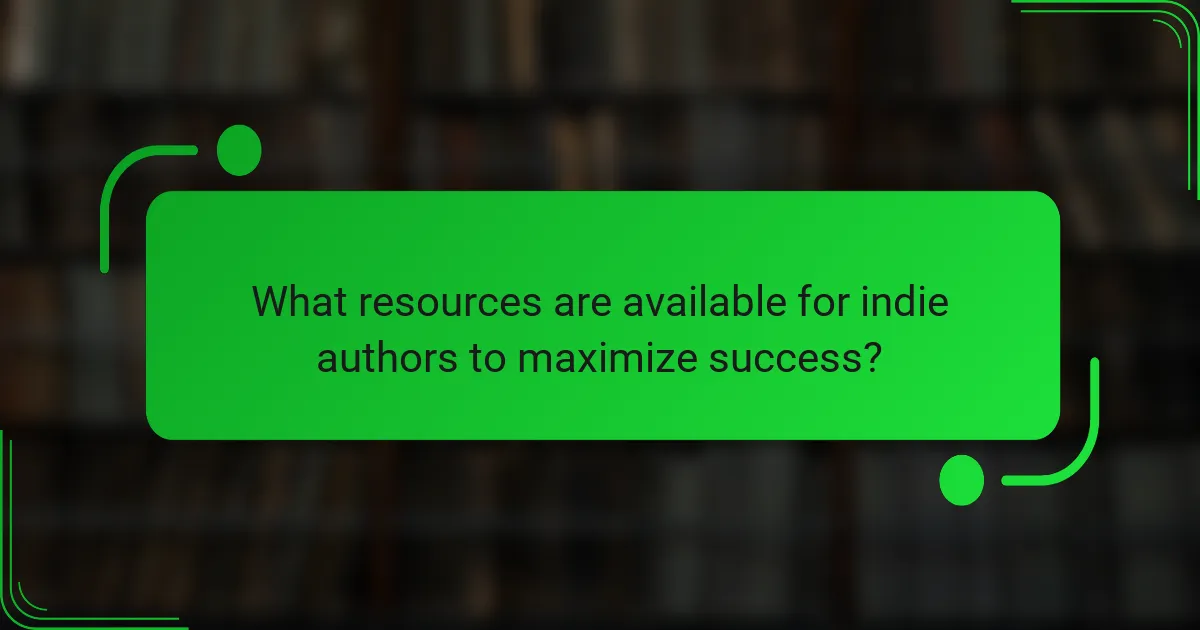
What resources are available for indie authors to maximize success?
Indie authors can access various resources to enhance their self-publishing success. Key tools include writing software, editing services, cover design platforms, and marketing assistance.
Writing software like Scrivener helps organize ideas and drafts, while editing services ensure polished content. Cover design platforms such as Canva provide user-friendly interfaces for creating professional book covers. Marketing assistance through platforms like BookBub or social media advertising can effectively reach target audiences.
Utilizing these resources can significantly improve the quality of the final product and increase visibility in a competitive market.
How can online communities support indie authors?
Online communities support indie authors by providing networking opportunities, sharing resources, and fostering collaboration. These platforms enable authors to connect with peers, receive feedback, and access tools essential for self-publishing success.
1. Networking Opportunities: Indie authors can meet like-minded individuals, forming valuable connections that enhance their visibility and support system.
2. Resource Sharing: Communities often share tips on writing, marketing, and publishing, helping authors navigate the self-publishing landscape effectively.
3. Collaboration: Authors can collaborate on projects, participate in anthologies, or engage in joint promotions, increasing their reach and audience.
4. Feedback Mechanism: Constructive criticism from community members aids in refining manuscripts and improving writing skills.
5. Emotional Support: The shared experiences within these communities provide encouragement and motivation, essential for the often solitary journey of writing.
What educational resources are beneficial for self-publishing?
Educational resources beneficial for self-publishing include online courses, writing communities, and publishing guides. These tools enhance knowledge of formatting, marketing, and distribution strategies. For example, platforms like Udemy offer courses on self-publishing techniques. Writer forums provide peer feedback and support. Comprehensive guides from successful indie authors outline essential steps for publication.
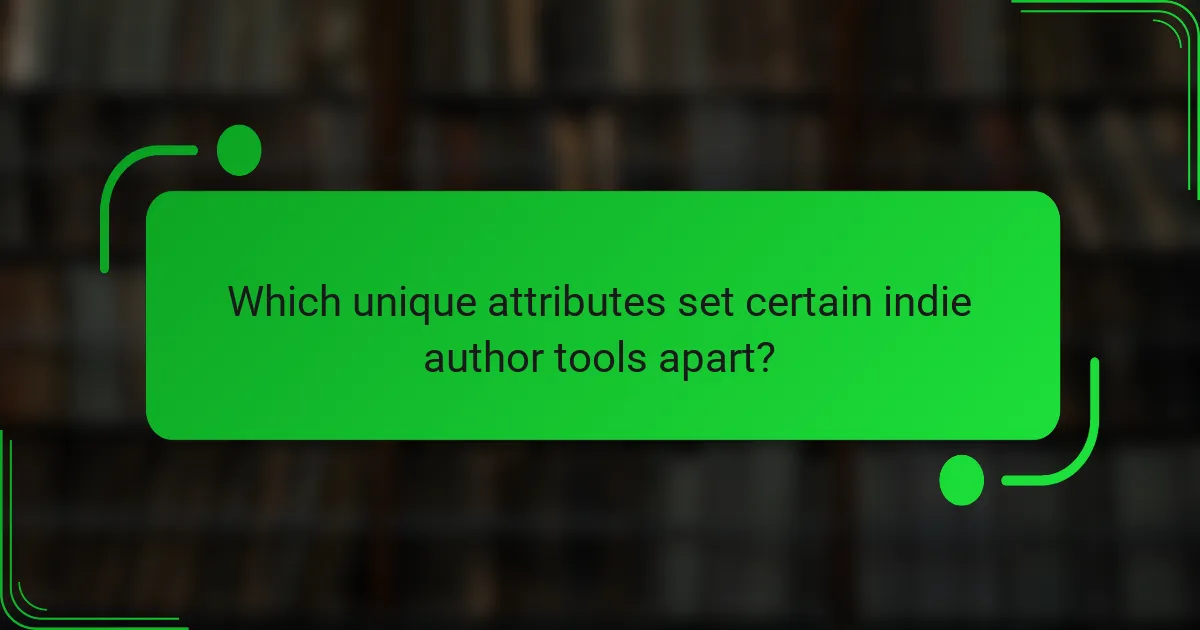
Which unique attributes set certain indie author tools apart?
Unique attributes that set certain indie author tools apart include customization features, user-friendly interfaces, integration capabilities, and pricing models. These aspects enhance the self-publishing process by providing tailored solutions for diverse author needs. For example, some tools offer unique formatting options that cater specifically to genre requirements, while others may provide advanced analytics to track book performance. Additionally, exceptional customer support can be a rare attribute that distinguishes one tool from another, ensuring authors receive timely assistance.
What innovative features should authors look for in writing tools?
Authors should seek writing tools with innovative features like AI-assisted editing, collaboration capabilities, and customizable templates. These tools enhance productivity and streamline the self-publishing process. For instance, AI can provide real-time feedback on writing quality, while collaboration features allow multiple authors to work seamlessly. Customizable templates help maintain brand consistency across different formats.
How do some platforms cater specifically to niche genres?
Platforms catering to niche genres offer tailored tools and resources for indie authors, enhancing self-publishing success. These platforms provide specialized formatting options, marketing strategies, and community support that align with unique genre characteristics. For example, some platforms focus on genre-specific cover designs and promotional tactics that resonate with targeted audiences. Additionally, they may offer analytics tools that help authors track performance within their niche, ensuring a more effective reach. This targeted approach fosters a supportive environment for indie authors, allowing them to thrive in their chosen genres.
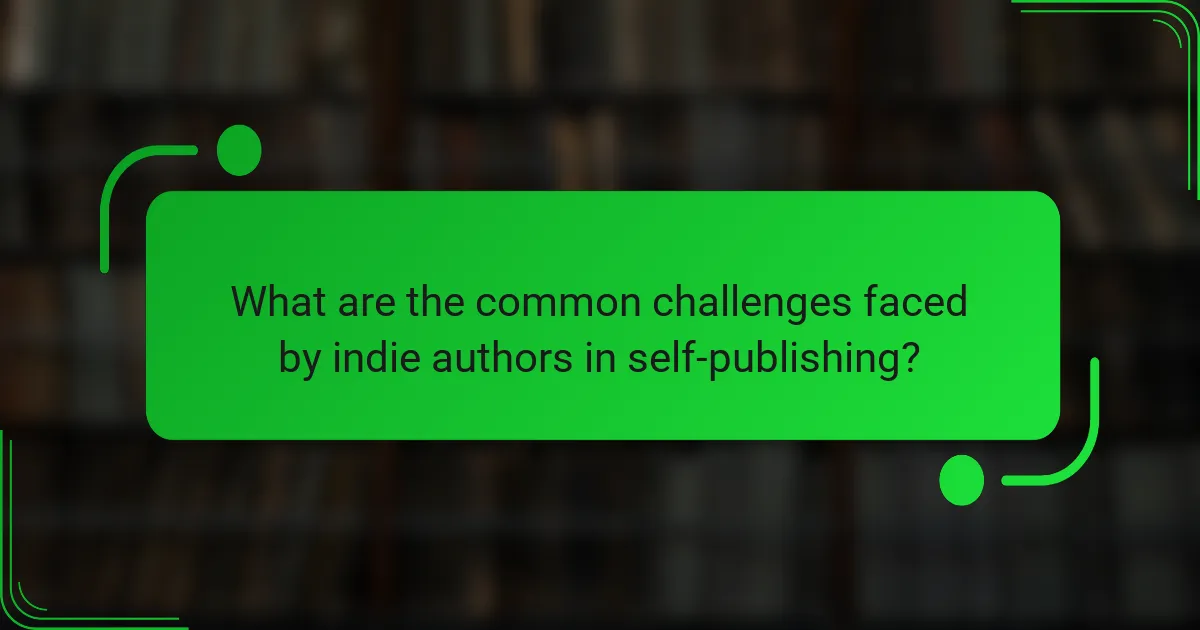
What are the common challenges faced by indie authors in self-publishing?
Indie authors face several common challenges in self-publishing, including marketing, distribution, and quality control. Marketing is often difficult due to limited budgets and competition. Distribution can be complex, with numerous platforms and formats to navigate. Quality control is crucial, as self-published works may lack the professional polish of traditionally published books. Additionally, indie authors may struggle with time management, balancing writing with the demands of publishing and promotion. These challenges can hinder their success without proper tools and resources.
How can tools help overcome marketing hurdles?
Tools can significantly alleviate marketing challenges for indie authors by streamlining processes and enhancing visibility. Effective tools help authors manage social media, design promotional materials, and track sales metrics. For instance, platforms like Canva enable professional graphic design without extensive skills, while social media schedulers automate engagement. Additionally, analytics tools provide insights into audience behavior, allowing for targeted marketing strategies. These resources ultimately contribute to self-publishing success by improving outreach and increasing sales potential.
What issues arise with distribution, and how can tools assist?
Distribution issues for indie authors include limited reach, high competition, and logistical challenges. Tools can assist by providing platforms for wider distribution, marketing automation, and inventory management. These tools streamline the self-publishing process, allowing authors to focus on writing. By leveraging analytics, authors can also target their audience more effectively, enhancing visibility and sales.
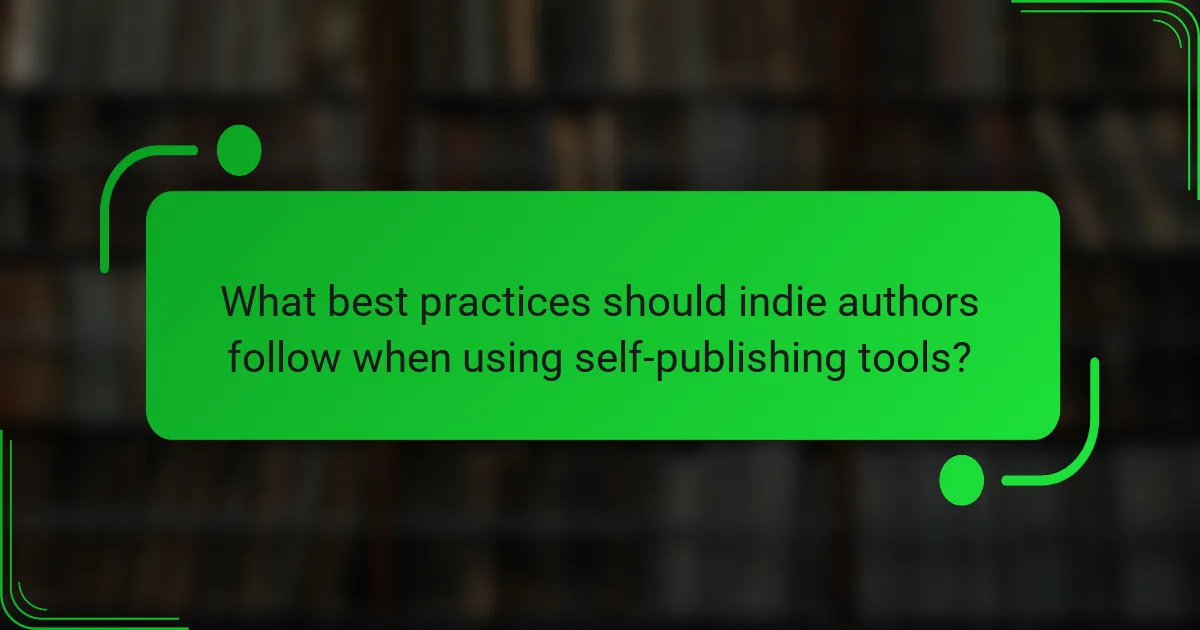
What best practices should indie authors follow when using self-publishing tools?
Indie authors should prioritize planning, research, and effective marketing when using self-publishing tools. First, understand your target audience and genre to tailor your content. Utilize professional editing and design services to enhance quality. Invest in marketing strategies that include social media promotion and email newsletters to reach readers effectively. Lastly, leverage analytics tools to track performance and adapt strategies accordingly.
How to effectively integrate multiple tools into the writing process?
To effectively integrate multiple tools into the writing process, prioritize compatibility and functionality. Start by selecting tools that complement each other, such as writing software, editing programs, and design platforms. Ensure they support seamless data transfer, which enhances workflow efficiency.
Consider using project management tools to organize tasks and deadlines alongside writing tools. This integration fosters a structured approach, keeping the writing process on track. Regularly evaluate the effectiveness of each tool to identify any that may no longer serve your needs.
Training and resources are vital for maximizing tool usage. Leverage online tutorials and community forums to enhance your skills. This investment in knowledge can significantly improve your self-publishing success.
What common mistakes should indie authors avoid when selecting tools?
Indie authors should avoid several common mistakes when selecting tools. First, they often choose tools without understanding their specific needs, leading to inefficiency. Second, overlooking user reviews can result in selecting subpar tools. Third, failing to consider compatibility with existing platforms can create integration issues. Fourth, ignoring budget constraints may lead to overspending on unnecessary features. Lastly, neglecting to test tools before committing can result in dissatisfaction and wasted time.
How to leverage feedback from tools to improve writing and publishing?
To leverage feedback from tools effectively, analyze insights and apply them to enhance your writing. Utilize tools like grammar checkers and readability analyzers to identify areas for improvement.
1. Gather feedback from writing tools to pinpoint common errors.
2. Adjust your writing style based on readability scores to engage your audience.
3. Incorporate suggestions to refine your content structure and flow.
4. Monitor changes in reader engagement metrics post-implementation.
This iterative process fosters continuous improvement in your self-publishing efforts.


